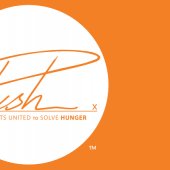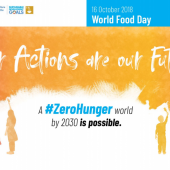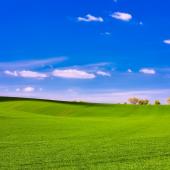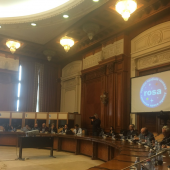Welcome to the GODAN Summit 2016 Blog Series. Each week, we will post a blog written by a participant of our Summit held in New York City on September 15-16. This week's blog is written by Thomas Baker, an independent FAO consultant.
"A Global Data Ecosystem for Agriculture and Food" - a new GODAN discussion paper, reviewed
At the GODAN Summit of 15-16 September 2016 in New York, consultants Dean Allemang and Bobbin Teegarden presented a new GODAN discussion paper, "A Global Data Ecosystem for Agriculture and Food".
Feeding nine billion
The challenge of feeding nine billion people in 2050, with minimal harm to the environment and maximum benefit to national economies and farmers, will require a fundamental transformation of the global food system.
Innovation, driven by a smarter use of data, can bring about a more efficient use of resources, limit food waste and soil degradation, and help farmers make sound decisions when faced with water shortages, pest outbreaks, and climate change.
Weather maps, satellite photos, geological models, soil sample data, market numbers, agronomic research results, temporal series on crop yields, and barcodes for tracking products "farm to fork" are generated today not just by researchers, government agencies, and businesses, but by farmers equipped with precision instruments and smartphones.
Precision agriculture requires that data from different sources be combined in novel ways. Research is compared against new empirical results. Agronomic data is related to demographic trends. Weather data is superimposed on terrain models. Soil chemistry is correlated with inventories of organisms.
Incorporating open data
When such data is freely available on the Internet ("open data"), it creates a marketplace for developers of customized solutions, such as smartphone apps. Good data can inform good decisions, such as choosing between a broad-spectrum pesticide and one targeted to a specific organism.
Data from a diversity of sources can be more efficiently re-mixed for specific applications when it is properly aligned to publicly available data-definition vocabularies and uses authoritative identifiers for entities such as organisms and diseases.
Progress towards sharing and aligning vocabularies was reported at the GODAN Summit, including the creation of the VEST/AgroPortal Map of Standards as a merger of two existing services under the GODAN Action program, and the Global Agricultural Concept Scheme (GACS), which merges concepts from three major agricultural thesauri into a jointly maintained concept scheme.
Data useability
Data is only useful if it can be trusted. One step towards establishing trust is to record the content of data, and the context of its creation ("provenance"), in metadata. Metadata is a hard requirement for data that is unstructured, such as images, or voluminous, such as satellite feeds.
Data is optimally useful when it is "Findable, Accessible, Interoperable, and Reusable" (the FAIR principles), or when it scores high on the Berners-Lee scale: one star for simply being published on the Web, two for also being in a machine-readable structure, three for using non-proprietary formats, four for using globally citable identifiers (URIs), and five for linking out to related datasets.
These five stars are operationalized with measurable criteria in Open Data Certificates from the Open Data Institute. Compliance with such principles is best achieved using the W3C Resource Description Framework (RDF), a general-purpose data language that facilitates linkage between data sources.
The GODAN discussion paper was commissioned by Syngenta, a Swiss agro-business that has placed open data at the center of its corporate strategy with a Good Growth Plan for improving crop efficiency, empowering smallholders, rescuing farmland, promoting biodiversity, and improving conditions for workers.
In his foreward, Stanley Wood of the Bill and Melinda Gates Foundation advocates "thinking big but starting small": to build the global data ecosystem by starting with concrete problems that need to be solved while aiming at industry-wide change in the culture of cooperation.
No single government agency or corporate entity can effect such change; the job is is too big and nobody trusted by all.
As Jeni Tennison, CEO of Open Data Institute, puts it: "Each project in which data is used or shared may seem like a small seed, but it's from those seeds that our data infrastructure will grow."
Author Biography
Thomas Baker is an independent Semantic Web consultant currently helping FAO build the Global Agricultural Concept Scheme (GACS). His background is in social sciences, with a PhD in Anthropology at Stanford University (1989) followed by work at a socio-economic research institute in Italy. Drawn to the Internet in the 1980s by The WELL, he switched fields via a masters in library science at Rutgers University to work at the German National Research Center for Informatics (GMD). He has worked at Goettingen State Library and taught at the Asian Institute of Technology (Bangkok) and Sungkyunkwan University (Seoul). Long a member of the DCMI Directorate, he has consulted on numerous projects, notably related to professional education (LD4PE Project) and agricultural semantics (AGROVOC and GACS). He co-chaired the W3C working group that published Simple Knowledge Organization System (SKOS), the technical basisfor GACS. Viewing RDF as the language of data, with persistent URIs as its footnotes, he advocates for semantic approaches that are multilingually inclusive and sustainably simple.






